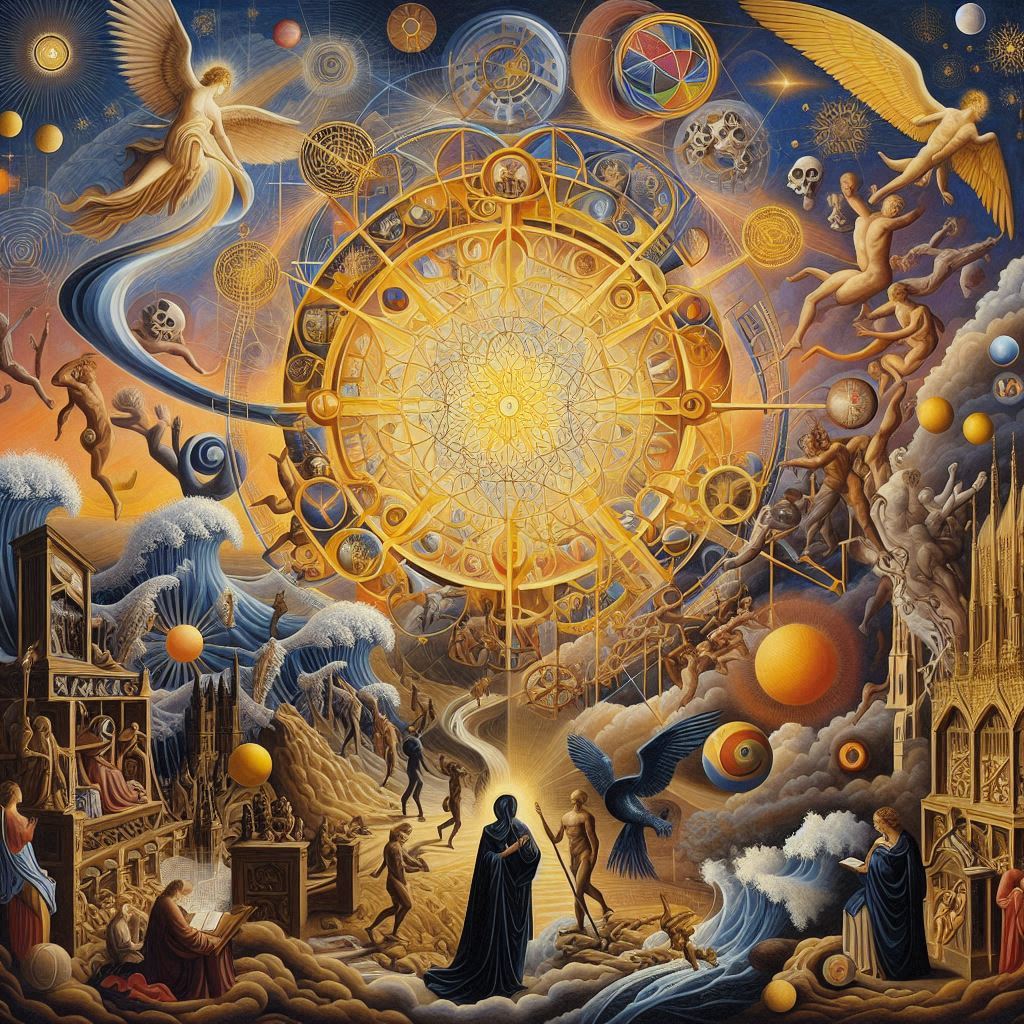Lesallan | April 6, 2025

Martin Luther’s Legacy: Philosophy’s Role in Shaping His Theological Revolution

Martin Luther’s Legacy: Philosophy’s Role in Shaping His Theological Revolution
Martin Luther, the pioneering figure of the Protestant Reformation, has left an indelible mark on Christianity. While his theological writings and reformist actions are widely celebrated, his nuanced relationship with philosophy deserves thoughtful exploration—especially for those seeking to understand how intellectual traditions can intersect with faith.
In Luther’s time, philosophy was largely intertwined with theology, and university curricula often introduced scholars to philosophical reasoning as a foundation for theological inquiry. Luther himself studied philosophy, particularly the works of William of Occam, whose emphasis on divine revelation over human reason resonated with Luther’s developing theological outlook. While Luther appreciated philosophy as a tool for critical thinking and societal order, he was deeply wary of its potential to challenge or overshadow biblical truths.
He famously referred to reason as “the devil’s whore,” a provocative metaphor that reveals his distrust of human logic when applied to spiritual matters. Luther believed human reason was prone to error and inadequacy in interpreting divine will. For him, the gospel and divine revelation were supreme, and he argued that philosophy should remain subordinate to these truths. This tension between reason and faith shaped his rejection of many Catholic Church practices at the time, which he saw as overly reliant on human interpretations of doctrine.
Nonetheless, Luther did not dismiss philosophy outright. Instead, he believed it could be used positively—when grounded in scripture—to understand and organize worldly matters. For modern Christians, Luther’s perspective invites reflection on the role of intellect in deepening faith without compromising spiritual truths. His approach serves as a reminder that while philosophy and reason have their place, they must ultimately serve to illuminate, not overshadow, the gospel message.
Luther’s legacy challenges Christians to consider how intellectual traditions can complement, rather than compete with, their faith. In today’s hyper-connected world, where diverse philosophies and ideologies constantly vie for attention, Luther’s insistence on grounding reason in divine truth remains as relevant as ever.
In Christ Blessings,
Lesallan
Postscript:
“Whoever drinks beer, he is quick to sleep; whoever sleeps long, does not sin; whoever does not sin, enters Heaven! Thus, let us drink beer!” (Martin Luther, N.D).




37 Comments
Julie Archambault · April 10, 2025 at 12:24 pm
You are my inhalation, I have few web logs and very sporadically run out from to post .
pure yoga vibes · April 16, 2025 at 1:08 pm
Valuable info. Fortunate me I discovered your site unintentionally, and I’m stunned why this accident didn’t took place in advance! I bookmarked it.
Antonetta Larin · April 16, 2025 at 1:58 pm
Hello! I simply want to give a huge thumbs up for the great info you have got here on this post. I will be coming again to your blog for more soon.
rajapola login · April 16, 2025 at 2:15 pm
Do you mind if I quote a couple of your articles as long as I provide credit and sources back to your website? My blog is in the exact same area of interest as yours and my users would definitely benefit from some of the information you provide here. Please let me know if this alright with you. Many thanks!
Penetration testing and ethical hackers · April 16, 2025 at 3:11 pm
so much good information on here, : D.
Senix Corded Power Tools · April 16, 2025 at 4:45 pm
I don’t even know the way I ended up right here, however I thought this publish was good. I don’t understand who you’re but certainly you are going to a well-known blogger if you aren’t already 😉 Cheers!
omaslot · April 16, 2025 at 5:02 pm
Wow, amazing blog structure! How long have you been running a blog for? you made blogging look easy. The whole glance of your web site is fantastic, as smartly as the content material!
Ethical hacking tools · April 16, 2025 at 9:11 pm
Hi there, I found your site via Google while looking for a related topic, your site came up, it looks good. I have bookmarked it in my google bookmarks.
Bíblia sagrada · April 17, 2025 at 1:34 am
Howdy! I’m at work surfing around your blog from my new iphone 4! Just wanted to say I love reading through your blog and look forward to all your posts! Carry on the superb work!
Mitolyn · April 17, 2025 at 5:13 am
An interesting dialogue is price comment. I believe that you should write extra on this topic, it might not be a taboo topic but usually persons are not enough to speak on such topics. To the next. Cheers
BeastForce · April 17, 2025 at 6:03 am
Hiya, I am really glad I’ve found this information. Nowadays bloggers publish just about gossips and internet and this is actually frustrating. A good blog with interesting content, that’s what I need. Thank you for keeping this site, I’ll be visiting it. Do you do newsletters? Can not find it.
quitsmoking · April 17, 2025 at 7:24 am
You can definitely see your enthusiasm in the work you write. The world hopes for even more passionate writers like you who aren’t afraid to say how they believe. Always go after your heart.
tinnitusmiracletreatments.com · April 17, 2025 at 12:39 pm
Hello! I could have sworn I’ve been to this blog before but after browsing through some of the post I realized it’s new to me. Anyways, I’m definitely happy I found it and I’ll be book-marking and checking back frequently!
GlycoShield · April 17, 2025 at 3:05 pm
Woah! I’m really enjoying the template/theme of this website. It’s simple, yet effective. A lot of times it’s very hard to get that “perfect balance” between usability and appearance. I must say you’ve done a great job with this. Additionally, the blog loads very fast for me on Internet explorer. Excellent Blog!
Std clinic bangkok · April 17, 2025 at 8:36 pm
Your home is valueble for me. Thanks!…
Memo Force · April 17, 2025 at 9:46 pm
Hey there would you mind sharing which blog platform you’re working with? I’m planning to start my own blog in the near future but I’m having a tough time making a decision between BlogEngine/Wordpress/B2evolution and Drupal. The reason I ask is because your design seems different then most blogs and I’m looking for something unique. P.S Apologies for being off-topic but I had to ask!
ผสมชื่อ · April 17, 2025 at 10:25 pm
I have been absent for a while, but now I remember why I used to love this blog. Thanks, I will try and check back more often. How frequently you update your site?
togelup · April 17, 2025 at 11:28 pm
Some truly nice and useful info on this web site, too I conceive the style and design contains superb features.
autospin777 · April 18, 2025 at 12:03 am
I see something really special in this website .
Prime Biome · April 18, 2025 at 5:42 am
When I originally commented I clicked the -Notify me when new comments are added- checkbox and now each time a comment is added I get four emails with the same comment. Is there any way you can remove me from that service? Thanks!
Lesallan · April 18, 2025 at 6:09 am
Sign out and then re-register.
animal rights · April 18, 2025 at 5:45 am
I know this if off topic but I’m looking into starting my own blog and was curious what all is needed to get setup? I’m assuming having a blog like yours would cost a pretty penny? I’m not very internet savvy so I’m not 100 sure. Any tips or advice would be greatly appreciated. Appreciate it
Lesallan · April 18, 2025 at 6:09 am
Try GoDaddy
basket168 link alternatif · April 18, 2025 at 7:09 am
It?¦s in reality a great and useful piece of info. I am satisfied that you simply shared this useful information with us. Please stay us informed like this. Thanks for sharing.
Tonic Greens · April 18, 2025 at 3:12 pm
F*ckin’ tremendous things here. I am very glad to see your post. Thanks a lot and i am looking forward to contact you. Will you kindly drop me a e-mail?
https://theanalystagency.com · April 18, 2025 at 7:49 pm
There is perceptibly a bundle to know about this. I feel you made certain good points in features also.
teste cs satélite · April 18, 2025 at 9:13 pm
hello!,I love your writing so a lot! percentage we keep up a correspondence extra about your article on AOL? I require a specialist on this space to resolve my problem. May be that is you! Looking forward to look you.
เช่ารถแบคโฮ · April 18, 2025 at 10:35 pm
We’re a group of volunteers and starting a brand new scheme in our community. Your web site offered us with valuable info to work on. You have done an impressive activity and our entire community will likely be grateful to you.
rajabandot link terbaru · April 18, 2025 at 11:11 pm
Hi my friend! I want to say that this article is awesome, nice written and include approximately all important infos. I would like to see more posts like this.
https://southfloridakiteboarding.com · April 19, 2025 at 12:42 am
Excellent post however , I was wondering if you could write a litte more on this subject? I’d be very grateful if you could elaborate a little bit more. Thank you!
residential painting contractor · April 19, 2025 at 2:29 am
I am usually to blogging and i actually admire your content. The article has actually peaks my interest. I am going to bookmark your website and maintain checking for new information.
rajabandot link terbaru · April 19, 2025 at 8:08 am
I think other website proprietors should take this web site as an model, very clean and magnificent user friendly style and design, as well as the content. You’re an expert in this topic!
find here · April 19, 2025 at 10:48 am
Very good written information. It will be helpful to anyone who utilizes it, including yours truly :). Keep doing what you are doing – looking forward to more posts.
Perron Hill Lawn Care · April 19, 2025 at 12:52 pm
I do consider all the ideas you have presented to your post. They’re very convincing and will certainly work. Still, the posts are too short for beginners. May just you please prolong them a bit from subsequent time? Thank you for the post.
rajabandot link alternatif · April 19, 2025 at 2:32 pm
I have read a few good stuff here. Certainly worth bookmarking for revisiting. I surprise how much effort you put to make such a fantastic informative site.
rajabandot link terbaru · April 19, 2025 at 10:29 pm
Hi, i think that i saw you visited my site thus i came to “return the favor”.I’m trying to find things to enhance my web site!I suppose its ok to use some of your ideas!!
Nerve Freedom · April 20, 2025 at 1:53 am
Hello my friend! I wish to say that this article is amazing, great written and include approximately all important infos. I would like to see extra posts like this .
Comments are closed.